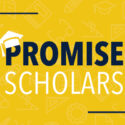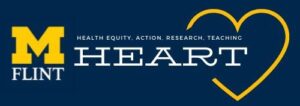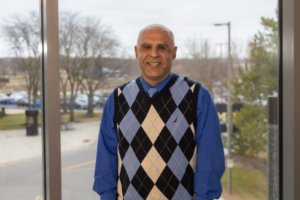The University of Michigan – Flint’s Promise Scholar Program is a grant-funded project that has a long history of helping students achieve success. Students whose high school GPA falls below UM-Flint admission requirements can enter the program and be a part of a tight group of around 30 students who get a bunch of extra support and build relationships that last a lifetime.
The program, housed in UM-Flint’s Educational Opportunity Initiatives office, starts with a summer Bridge program, which is currently made up of a first year experience class combined with an intro-level sociology course. Promise scholars live on campus during the 7-week Summer Bridge Program at no cost to them, and they go into their first fall semester with 6 credits already completed.
Jariah Womack, a second-year Promise scholar from Carman-Ainsworth in Flint township majoring in social work, said, “the biggest impact for me was just being able to come into college with so much experience and know so many things already instead of graduating straight from high school and just being thrown into college. I thought college would be somewhat like high school, but in reality it’s totally different.” She mentioned that there are six different programs and workshops that bring them together during the fall and winter semesters, which are helpful and give them a chance to “remember each other’s faces.”
The program is currently run by John Girdwood. He is a LEO Lecturer I in sociology in addition to his role as Program Manager in the Division of Student Affairs. “As a sociologist,” he said, “I can work with research assistants and apply a social science lens to the project.” Toward that end, he’s guiding some of the students through a meta-analysis of the program.
Promise scholars Nikolas Davis, a Summer Undergraduate Research Experience fellow, and Womack, an Undergraduate Research Opportunity Program intern are working with Girdwood on this research. Womack started examining the history of the program with UROP student researcher Callie Miller last year. This past summer, Davis and Layla Youssef examined the program along the metrics of retention, students’ sense of belonging, and academic outcomes and compared it to similar programs across the country.
Some of their work will be published in an upcoming anthology together with essays written by their peers on issues that they have identified as important and relevant to their lives. Local business Brandon Publishing will be releasing it later this year.
Womack said that they got a chance to access the UM-Flint research library and archives for the project. “I feel like it was really cool for us to look at actual documents, they went back almost sixty years, and hold them in our hands to scan through them,” she said, “I feel like that was a really good experience just to do that.”
Girdwood said, “one of the most remarkable things, for me, is that this program dates back over half a century and very little has changed since it started.” Originally called the “Challenge Program,” it was created in 1968 through funding from the C.S. Mott Foundation. This was in the wake of President Lyndon Johnson’s “Great Society” initiative, which recognized the relationship between racial disparity and academic opportunity and made ambitious efforts to address them.
In the 1970’s, the program began to get national attention because the supports it offered increased retention rates and GPA for its students above even the class average and increased minority enrollment by over 10%. Just as the Mott Foundation and Flint public schools influenced the nation with the Community Education program, the Challenge Program became a model of inspiration. At the time, the Challenge program was limited to Flint area students, but is now expanded across the state.
The current Promise Scholar program is funded in numerous ways. It has been supported for the past couple of decades by base funding from the State of Michigan’s King, Chavez, Parks (KCP) Select Student Support Services (4-S) Program, currently an annual contribution of $124,163. There is an additional $56,452 shared-cost contribution from UM-Flint. UM-Ann Arbor and UM-Flint have contributed other funds for 3 years that provide additional supports like free meals, housing, and $2k stipends for Promise Scholars’ first four semesters.
Further support comes from the Barry and Denise Trantham Promise Scholar Program Fund, Educational Opportunity Initiatives Bridges to Success Program Book Scholarship, and the M-Club of Greater Flint Promise Scholar Book Fund. Promise Scholars Chris Hartman and Joe Bishai received M-Club book scholarships this year. Promise Scholars can also receive various tuition scholarships. This year, the Mukkamala and Kulkarni Family Scholarship provided $3,500 to first-year student Summer Smith from Fenton who is studying Physical Therapy.
The KCP initiatives, like the 4-S funding that supports the Promise Scholars program today, includes many partnerships with colleges, universities, and 6-12th grade schools across the state to help guide students toward college and provide economically or academically disadvantaged students with equal opportunities. The state of Michigan KCP grant application itself lists three best practices to be very effective for schools to reach disadvantaged students and institute change: “commitment to the program at the president’s level, programs that address change in institutional systems, and programs that encourage faculty involvement.” The Michigan department of labor and economic opportunity points to these practices as “critical to improving students’ persistence to baccalaureate completion.”
As Chancellor Dutta noted in his most recent Regents Roundup newsletter: “[the] approved budget for fiscal year 2023 allows us to provide a host of support services designed to help students persist in their education and earn their degrees.” Promise Scholars and the related programs are compelling examples of the State of Michigan’s support for college readiness and retention efforts. It is an ongoing effort to build a sense of belonging which has always relied heavily on UM-Flint faculty. “The most important aspect of the Promise Scholars program,” according to Girdwood, “is the relationships we get to form with students on an individual basis.”
Womack echoed this sentiment when talking about the program. She said that one of the key benefits of the Summer Bridge Program was to prepare students for how to interact with professors, and that the relationships the Promise scholars are forming are meaningful. “In our research, we emailed a previous student from, like, the 80’s or 90’s,” she said, “and he told us that [the program] really helped him build lifelong friendships, people that he invited to his wedding. It’s cool to see how this one small program at this small university can create bonds that can last a lifetime. That was the thing that stuck to me most from all the research we did.”
In addition to the historic nationwide influence from the success of the program, research and conversations happening around Persistence and Mattering in Undergraduate Education on campus are giving Girdwood lots of chances to advocate for the effectiveness of the Promise Scholar program. The research they are doing is tying the threads between these relationship-rich practices and skills employers are looking for in the workforce.
Even off-campus, Girdwood said, “from sharing my experience at the NCORE conference in Portland to all of the one-on-one conversations, any time you make these connections with administrators or faculty around these issues, it’s priceless. Good things happen.” The students themselves are a part of some of these conversations about what would be helpful for the student population in general. “I think it would be very helpful for everyone involved,” said Womack, “if students who were maybe overqualified for the program still came to be like a type of mentor and participated,” recognizing how relationship building lifts us all up.





